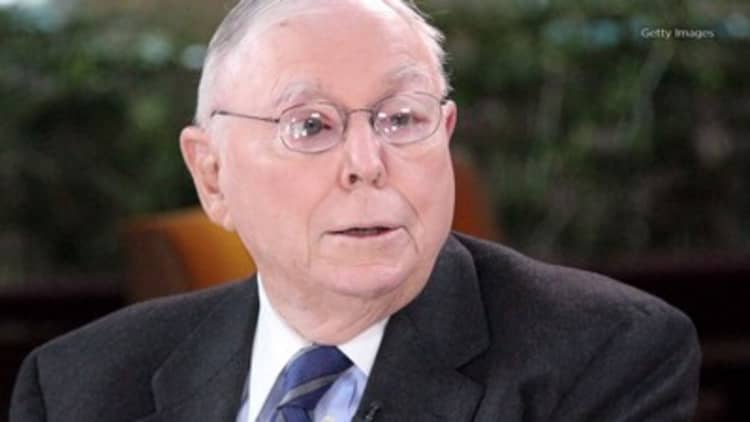Berkshire Hathaway executives Warren Buffett and Charlie Munger have been business partners and friends for nearly 60 years and each has greatly influenced the other.
"Every time I'm with Charlie, I get at least some new slant on an idea that causes me to rethink certain things," Buffett said in a joint interview with Munger on CNBC's "On The Money."
Munger's deep understanding of psychological influence over business and career decisions may be to thank.
In the early 1990s, Munger gave several speeches on the intersection of economics and psychology. During a speech at Harvard University, Munger notes that trying to keep those two concepts separate was costing him "a lot of money."
Munger shared a list of 24 psychological tendencies that he's aware of when making business and career decisions. A recent video by investment firm Tiny Capital and animation studio Thinko illustrates an abridged version of this speech:
In the speech, Munger paired the following psychological phenomena with business examples to demonstrate how psychology and economic decision-making go hand in hand:
Pavlov's theory of classical conditioning
Munger says he has never taken a course in psychology or economics, but he did learn about Russian physiologist Ivan Pavlov in his high school biology class.
In the late 19th century, Pavlov studied whether external stimuli could start the digestion process by giving food to dogs after ringing a metronome. The dogs would learn to associate the ringing with incoming food and would start to salivate.
Pavlov called creating this association "conditioning," according to the PBS show "A Science Odyssey."

"Well, the truth of the matter is that Pavlovian association is an enormously powerful psychological force in the daily life of all of us," Munger says. "And, indeed, in economics we wouldn't have money without the role of so-called secondary reinforcement."
Munger says three-fourths of advertising works on pure Pavlovian conditioning. He mentions Coca-Cola as an example.
"They want to be associated with every wonderful image: heroics in the Olympics, wonderful music, you name it," he says. "They don't want to be associated with presidents' funerals and so forth."
The bystander effect and social proof
Munger and Buffett have publicly and repeatedly shared their rejection of the market efficiency theory, which states it is impossible for companies to beat the market through stock picking. In the speech, Munger slightly brags about their success outside of this theory, calling it "a wonderful economic doctrine that had a long vogue" despite Berkshire Hathaway's success.
Munger uses the examples of the bystander effect and social proof to demonstrate that many investors are just a bunch of followers.
"The bystander effect occurs when the presence of others discourages an individual from intervening in an emergency situation," according to Psychology Today. The concept was popularized after the infamous murder of Kitty Genovese in 1964. She was reportedly stabbed to death outside her home while bystanders observing the scene did nothing.
In this moment the witnesses are said to have exhibited social proof, a phenomena researcher Robert Cialdini describes as "when people ... do things that they see other people doing."
"Now, one of the explanations is that everybody looked at everybody else and nobody else was doing anything," Munger says in his speech, "and so there's automatic social proof that the right thing to do is nothing."
Munger compares those bystanders to "big-shot businessmen" who, instead of betting against the market, simply make investments others are making.
"There are microeconomic ideas and gain/loss ratios and so forth that also come into play," Munger says. "I think time and time again, in reality, psychological notions and economic notions interplay, and the man who doesn't understand both is a damned fool."
Don't miss: 3 psychological habits Buffett's partner Charlie Munger warns can hurt your career
4 reasons why Buffett's partner Charlie Munger considers Albert Einstein his hero
Like this story? Like us on Facebook!



